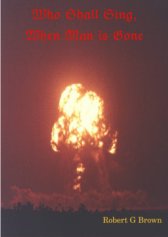by
Robert G. Brown
Duke University Physics Department
Durham, NC 27708-0305
Copyright Robert G. Brown, 2026
Abstract

Each of the poems in this work has something of a story to it. ``The
Passing of the Time of Man'' has more than just a story -- it was a
large part of my literary/poetic life for five to ten years. It was
written before the iron curtain came (predictably enough) crashing down,
and reflects the overwhelming cynicism that affected the whole
generation of kids (like me) who were brought up in the shadow of the
thermonuclear fusion bomb. Every day of my life from the day that I was
born until very, very recently, there was a finite (and not particularly
small) chance that some accident of fate or some insane act of malice
would create a holocaust that would level civilization.
It used to bother me that if the nuclear winter, nuclear summer, or
fallout everywhere theories were actually correct, that nobody would
be able to write about what was undoubtedly the most significant event
to occur in mankind's short history. If the Trojan War was worth an
epic poem, so was this. The only trouble was, it had to be written
before the event. So I did.
For what it's worth, the picture on the cover of the book is of the
"Apple" nuclear test set off in the Nevada desert on March 29, 1955, a
day that just happens to be my birthday. My life began, as you can see,
with quite a blast. Hopefully it won't go out that way.
Many of the poems derive from philosophy or physics. Some of my
favorites in the former category include "In Defense of a Natural
Religion" and the Koans at the end. Relativity theory, in particular,
has a beautiful and poetic interpretation in which the world as we know
it is like a tapestry of interwoven world lines, solid and stationary in
four dimensions, woven by the hand of God on looms unknown. This idea
appears in several poems, e.g. -- "The Gods", "Sadness", "Deja Vu".
Some of the poems are very much political. In particular, "The Quiet
Killing" was inspired by a National Public Radio news show in which they
interviewed a reporter who had personally investigated the Kurdish
massacre orchestrated by the Iraqi government. The poem is an
essentially accurate description of the events he reported, including
the eyewitness testimony of a young boy who escaped by crawling into a
nearby ditch.
If I had to pick my own favorite poems, the list would include (in no
particular order) "Old Age", "Resurrection", "The Hill" (which I read at
my Father's funeral), "Prayer for Mankind", "When Halley's Comet Came
Too Soon", "Wisdom" (written for my first son Patrick soon after his
birth), "Image" and the two Koans at the end. I also like (of course)
much of "The Passing of the Time of Man". However, I "like" something
about all of the poems herein, or I would not have included them.
It is my hope that some of them may sing to you as they sung to me when
I wrote them. If you find yourself, one day in the future, with a tiny
snatch of one of these poems flitting through your thoughts like an
errant hummingbird, annoying you because you cannot remember where you
read it but you really liked it, then I will be most pleased.
Many of these poems have been published, formally or informally,
before outside of this website. They were featured on the
cruxweb webring and on the site of Samantha A. Wallachy, the
(then) cruxweb webmistress, and will be featured on her new site, The Artistic Apex as soon as I
have a chance to send her some selections. Others have been
republished, with lovely illustrations created by Elizabeth Armstrong,
all the way Down Under in Australia.
The lulu printing above is the first time that they have all been
available in a nicely bound, printed form, however, and as starving
poets need to eat, I certainly hope that you'll consider buying a hard
copy if you did in fact like the poems enough to want to share them or
read them again.
Feel free to let me know what you think of these poems. You can send
me email or mail at the address given in the Contact links on this page.
If you like them, and find yourself returning to read them from
time to time, feel free to drop a dollar in the metaphorical banjo case
in the intro...
|
Contents
| Document Type | Size (K) | Last Modified |
| Online |
N/A |
07/03/24 |
|

 to help spread the word so others can find it as well.
Note, Robert G. Brown is generally either rgb or rgbatduke on many external
sites crosslinked here.
to help spread the word so others can find it as well.
Note, Robert G. Brown is generally either rgb or rgbatduke on many external
sites crosslinked here.
 Who Shall Sing, When Man Is Gone
Who Shall Sing, When Man Is Gone